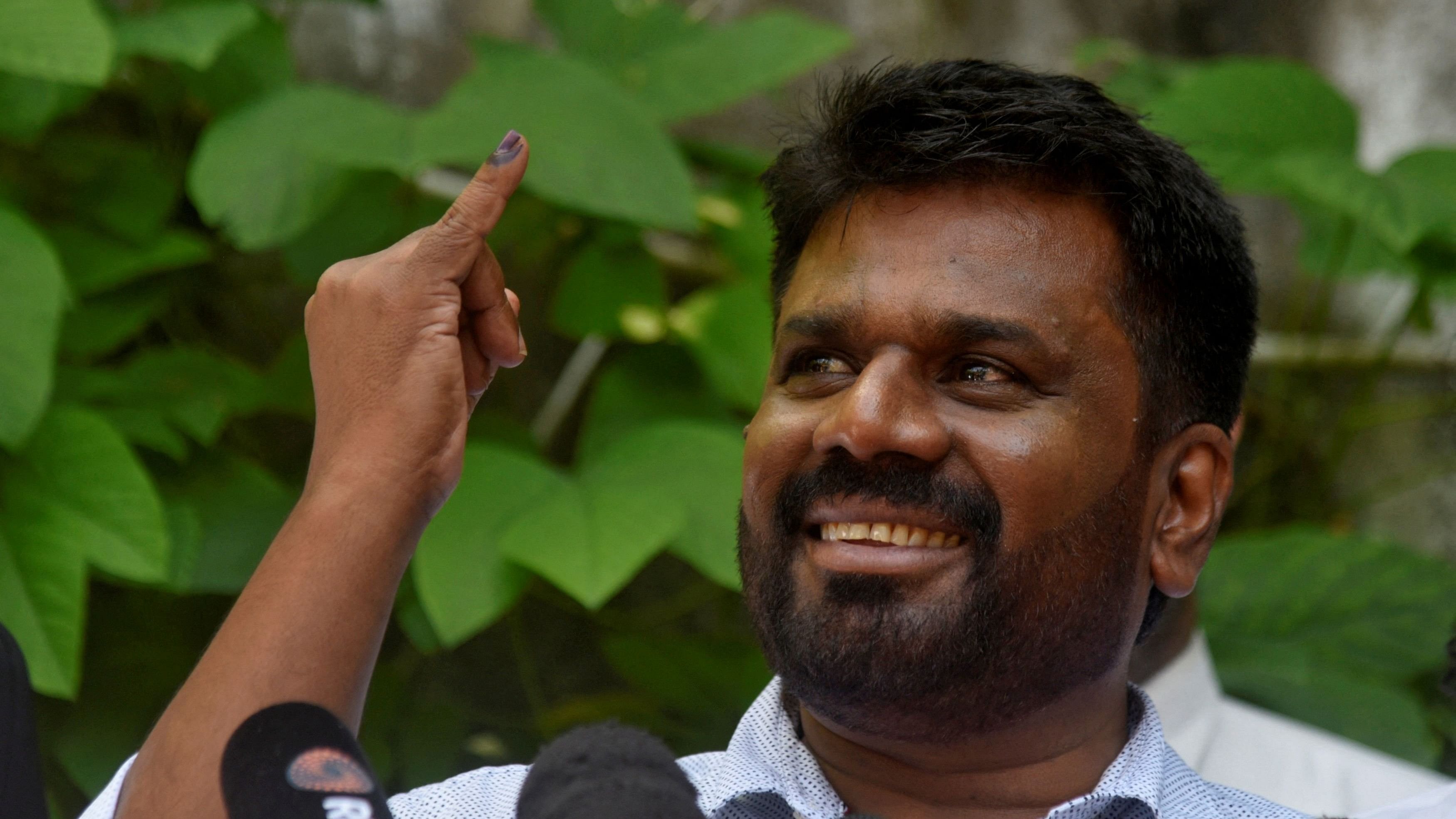
Anura Kumara Dissanayake, the presidential candidate from National People's Power, shows his ink-marked finger after casting his vote at a polling station, on the day of the presidential election, in Colombo, Sri Lanka, September 21, 2024.
Credit: Reuters Photo
Chennai: Left-leaning Janatha Vimukthi Peramuna’s Anura Kumara Dissanayake is leading the Sri Lankan Presidential elections by securing about 40 per cent of votes polled in Saturday’s watershed election, the first after the country faced an unprecedented economic crisis in 2022.
55-year-old Anura, popularly known as AKD and perceived to be close to China, established an early lead of about 50 per cent Sunday morning but the percentage came down gradually with his runner-up Sajith Premadasa closing in.
At 12 noon Sunday, poll results showed Anura secured 25 lakh votes (39.44 per cent), while Sajith polled 21.24 lakh votes (34.06 per cent) and incumbent Ranil Wickremesinghe was pushed to a distant third with 10.94 lakh votes (17.55 per cent).
Namal Rajapaksa, the SLPP candidate and eldest son of former President Mahinda Rajapaksa, came a cropper by securing a mere 1.5 lakh votes (2.29 per cent), even trailing behind Ariyanethran Pakkiyaselvam, the common Tamil candidate who polled 2.10 lakh votes (3.37 per cent).
With just about seven per cent gap between the frontrunners and with none of the candidates securing 50 per cent plus one vote as per the Constitution, the Election Commission of Sri Lanka is likely to count the second and third preference votes, a move which will delay the formal announcement of results.
However, Anura’s camp told Daily Mirror newspaper they were confident that AKD will emerge as the winner and that he will take oath as the country’s next President by Monday.
As Anura continued to establish a steady lead since counting of votes began Saturday night, the camps of incumbent Ranil and LoP Sajith conceded defeat and congratulated the JVP leader on his victory.
The initial results showed deep divisions between the majority Sinhala and minorities like Tamils, and Muslims. While Sajith and Ranil secured more votes in Tamil-dominated Vanni, Jaffna, Trincomalee, Batticaloa, and Puttalam, it was all the way Anura in Sinhala-majority areas like Hambantota, the home district of the Rajapaksas.
Anura’s likely ascent to Sri Lankan Presidency is meteoric as he secured a mere 3.2 per cent votes in the 2019 Presidential polls that saw Gotabhaya Rajapaksa winning a landslide on national security plank following the deadly Easter blasts.
However, his key role in the 2022 Araghalya protests against the Rajapaksas and the political class caught the imagination of youngsters and old alike, who seem to have put their weight behind the Marxist-leaning party leader.
A ”fundamental change” in Sri Lanka’s political landscape was AKD’s war cry as he highlighted the sufferings of the masses during the economic crisis like 17-hour power cut, long queues outside shops, inflation soaring to new heights, and sky-rocketing prices of essential commodities in his campaign.
Anura’s likely victory truly marks a tectonic shift in Sri Lanka’s political landscape as this is the first time that a party representing the working class will be in power. However, Anura has an arduous task of convincing the international community that JVP, which had led two insurgencies in Sri Lanka in 1971 and 1987, will continue to steer Sri Lanka out of the crisis and ensure there is no trust deficit between his country and the West.
Anura should also live up to his promises of slash taxes to reduce burden on the people, while he should assure investors, including those from India, that their interests would be protected.
India, Sri Lanka’s closest neighbour which watched the polls with avid interest, is likely to reach out to AKD almost immediately after he is declared as the new President. Though JVP is widely perceived as “anti-India”, New Delhi did reach out to AKD as early as in February 2024 by inviting him to the country and held discussions with him.
It becomes absolutely imperative for both countries to work together given their strategic interests. Moreover, India has invested heavily in Sri Lanka after the end of the war in 2009, more so following the 2022 economic crisis.